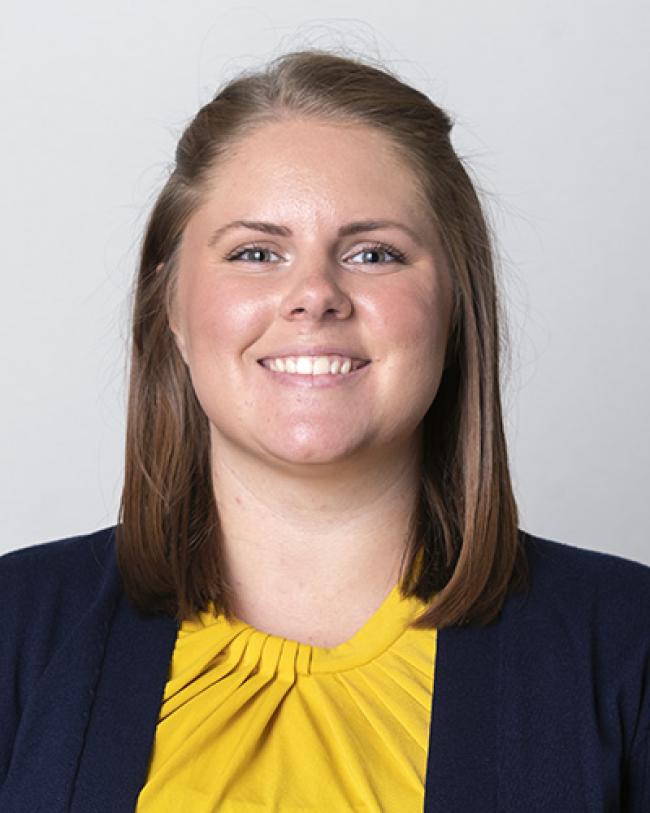Augustana students welcome future Vikings for It Begins with A, an annual event for newly admitted students.
Insights from an Augustana admissions counselor

Kassidy Belcher '21
Applying to colleges: What students should know
As college application season begins, Kassidy Belcher ’21, senior admissions counselor at Augustana College, offers guidance shaped by her experience on both sides of the admissions process — first as an Augustana applicant and now as a professional committed to helping high school students make informed decisions.
Belcher works closely with prospective students and families throughout their application journey. Her approach is grounded in the values she associates with Augustana: a supportive community, a willingness to embrace growth and a learning environment that encourages students to explore widely and ask meaningful questions.
From her experience as an admissions counselor, Belcher has developed an understanding of the questions, challenges and misconceptions that often shape decisions.
Q: What is the first step students should take when beginning the college application process?
Belcher: Google is their best friend. They should search for colleges in areas that interest them, look at their programs and see what stands out. And talk to people who’ve already gone through the process. Ask what they looked for and what surprised them. But most importantly, visit.
Virtual tours offer helpful overviews. They help students picture the spaces, get quick facts and ease into their search. But an in-person visit provides a deeper understanding of whether the campus environment matches a student’s expectations and needs.
Q: When should students begin working on their writing samples and requesting recommendation letters?
Belcher: Earlier preparation leads to better results. Ideally, students should begin outlining their personal statements during their junior year and request recommendation letters well before peak application season. It gives students time to think about what they want to write about, instead of scrambling near a deadline. And it gives their recommenders the space to write something thoughtful, because they’re balancing a lot, too.
Teachers and counselors often manage numerous requests. Providing them with ample time ensures more thoughtful letters and reduces unnecessary last-minute pressure for everyone.
Eric Rowell '93, assistant director of admissions and diversity outreach, looks on as a student rings the gong signifying her decision to come to Augustana.
Q: What makes a personal statement memorable?
Belcher: A memorable personal statement is one where students truly have fun and let their voice come through. They should not write for the admissions counselor; they should write something that feels like them. We read so many essays, and the ones that stay with us are always the unique, quirky or deeply personal ones.
I once worked with a student who wanted to write about how much he loves bread in all its varieties, and it was hilarious and thoughtful in a way that perfectly reflected who he was. Someone talked him out of it, and I still wish he had written it. Essays like that are exactly what we enjoy reading.
Q: What should students consider when comparing financial aid packages?
Belcher: A lot of families focus on the bottom line, but there are important questions behind that number that can change the full picture of affordability. I always tell students to dig deeper and ask whether the aid is renewable each year, whether any grants or awards change if they decide to live off campus, whether tuition stays the same or increases annually, and whether their package is based on the current year’s cost or the cost for the upcoming year.
It’s also important to know if anything in the award might disappear after the first year. Those details matter, and understanding them early can help students avoid unexpected surprises later on.
Q: What’s one piece of advice you wish you could give students before they submit their application?
Belcher: To use their resources. This process can feel intimidating, but students do not have to figure it out alone. Their high school counselor and admissions counselor are here to help, and we work with students every day who are navigating the same questions and uncertainties.
I suggest students ask questions, visit the schools they are excited about and build connections that help them understand what feels right. And do their research, even if it begins with something as simple as a Google search. There is a lot of information available, and the more they learn, the more confident they will feel in their decision.
By Yael Haddad '26
